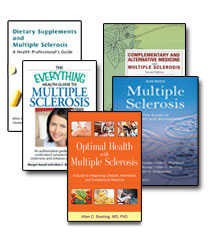Biofeedback is the process by which electronic monitoring instruments are used to display readouts of a person’s bodily functions, such as heart rate and muscle tension. With biofeedback, the person is asked to try to consciously manipulate these presumably “involuntary” functions. The idea is to use the mind-body connection to facilitate healing. This therapy has been studied as a treatment for many medical conditions, including MS.
Treatment Approach
To treat an individual using biofeedback, monitoring equipment must be applied to the body. This equipment is used to translate body processes into images or sounds for the individual to experience. The type of monitoring equipment is variable depending on what physiological system is being explored. Thermal biofeedback looks at skin temperature, electromyography (EMG) measures muscle tension, electrodermal response measures perspiration, and finger pulse biofeedback looks at pulse rate. Respiration biofeedback can measure rhythm, rate, and volume of breathing. Electroencephalography (EEG) biofeedback monitors brainwaves (neural electrical activity).
After the monitoring equipment is applied, a biofeedback therapist helps an individual alter the “involuntary” processes through physical or mental exercises. The monitoring equipment allows an individual to know when they are producing the desired change. Through experimentation and guidance from the therapist, an individual learns methods to manipulate the physiological process that is being addressed. Eventually, the individual can simply use the practiced methods, and does not need the monitoring equipment, to produce the desired physiological changes.
Evaluation in MS and Other Conditions
It is possible that biofeedback can be beneficial for addressing MS-associated symptoms. By helping an individual relax, insomnia and anxiety can be addressed through biofeedback. Biofeedback may also be useful in pain management, helping with migraines, tension headaches, and lower back pain. Formal work has not been completed addressing the use of biofeedback for the treatment of MS-associated pain.
There is some research that suggests biofeedback may be useful in dealing with urinary incontinence, a problem some people with MS experience. Medications and pelvic exercises are often used to treat this problem but sometimes do not completely eliminate it and may produce unwanted side effects. The studies addressing biofeedback and urinary incontinence have had mixed results. It may be possible that biofeedback is a useful complement to pelvic exercises, helping those who are unsure which muscles to use during pelvic exercises.
Bowel incontinence, another problem faced by some people with MS, may be improved through biofeedback. In one study, approximately 70% of people who suffer from bowel incontinence (unrelated to MS), saw some improvement in their symptoms. A smaller study addressing only MS-associated bowel incontinence showed benefits for about one-third of the participants.
Spasticity, or muscle stiffness, may occur in MS. No large studies examining biofeedback and MS-associated spasticity have been done, but work with people who have cerebral palsy suggest that benefits are possible.
Mixed results have been obtained in looking at biofeedback as a way to regulate the immune system. This area of research is of obvious interest when dealing with autoimmune conditions such as MS.
Biofeedback may also be beneficial for treating alcoholism, post-traumatic stress disorder, and drug abuse. It may also slightly decrease blood pressure and improve circulation.
Adverse Effects
Biofeedback is generally tolerated very well. Occasionally, mild side effects may occur, such as dizziness, anxiety, disorientation, and floating sensations. People with pacemakers or heart conditions should be cautious when considering electrodermal biofeedback; people with these conditions should consult with a physician before undergoing treatment. Medical supervision is advised when people with severe personality disorders or psychosis are using biofeedback.
Summary
Biofeedback is low-risk and potentially beneficial for some MS symptoms. It is a particularly useful tool when conventional medical approaches are not fully effective or cause adverse effects. Insomnia, pain, anxiety, muscle stiffness, and incontinence may all respond to biofeedback. Further research must be conducted in order to fully evaluate biofeedback as a treatment for MS-associated symptoms.
References and Additional Reading
Books
Bowling AC. Complementary and Alternative Medicine and Multiple Sclerosis. New York: Demos Medical Publishing, 2007, pp. 62-65.
Cassileth BR. The Alternative Medicine Handbook. New York: W.W. Norton, 1998, pp. 117–121.
Ernst E, ed. The Desktop Guide to Complementary and Alternative Medicine: An Evidence-Based Approach. Edinburgh: Mosby, 2001, pp. 40–42.
Fugh-Berman A. Alternative Medicine: What Works. Baltimore: Williams & Wilkins, 1997, pp. 41–46.
McGrady A. Biofeedback in the neurologic disorders. In: Weintraub MI, Micozzi MS,eds. Alternative and Complementary Treatment in Neurologic Illness. New York: Churchill Livingstone. 2001, pp. 156–165.
Journal Articles
Berghmans LCM, Hendriks HJM, Hay-Smith EJ, et al. Conservative treatment of stress urinary incontinence in women: a systematic review of randomized clinical trials. Br J Urol 1998;82:181–191.
Cattaneo D, Ferrarin M, Frasson W, et al. Head control: volitional aspects of rehabilitation training in patients with multiple sclerosis compared with healthy subjects. Arch Phys Med Rehabil 2005;86:1381–1388.
de Kruif YP, van Wegen Erwin EH. Pelvic floor muscle exercise therapy with myofeedback for women with stress urinary incontinence: a meta-analysis. Physiotherapy 1996;82:107–113.
Klarskov P, Heely E, Nyholdt I, et al. Biofeedback treatment of bladder dysfunction in multiple sclerosis. A randomized trial. Scand J Urol Nephrol Suppl 1994; 157:61–65.
Norton C, Hosker G, Brazzelli M. Biofeedback and/or sphincter exercises for the treatment of faecal incontinence in adults (Cochrane review). In: The Cochrane Library, Issue 2, 2000. Oxford: Update Software.
Wiesel PH, Norton C, Roy AJ, et al. Gut focused behavioural treatment (biofeedback) for constipation and faecal incontinence in multiple sclerosis. J Neurol Neurosurg Psychiatry 2000;69:240–243.






